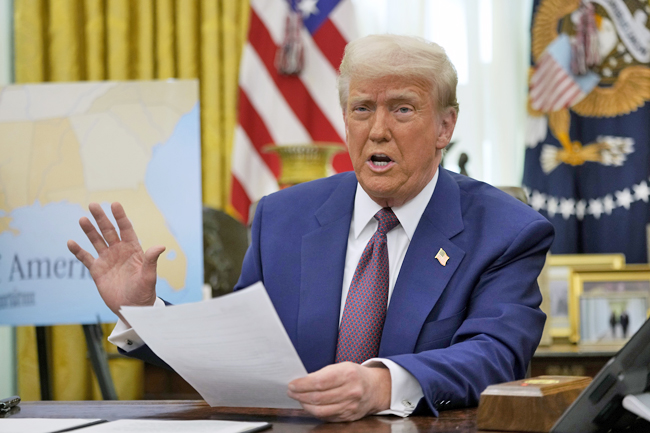ANN/THE KOREA HERALD – The Trump administration is reportedly preparing to renegotiate key agreements under the CHIPS and Science Act, a move that has raised concerns among global semiconductor manufacturers, particularly South Korea’s Samsung Electronics and SK hynix.
The anticipated revisions threaten to disrupt previously secured subsidies, casting uncertainty over planned investments in the United States.
According to a report by Reuters on Friday, the White House intends to reassess federal subsidies promised by the Biden administration to international chipmakers as part of efforts to bolster semiconductor production on American soil.
This review could lead to delays in the disbursement of funds and potential changes to the terms governing these financial incentives.
The CHIPS programme, which allocates USD39 billion in subsidies, includes stipulations that recipients must use unionised labour for factory construction and provide affordable childcare for workers.
The Trump administration is reportedly scrutinising these conditions, raising concerns about the feasibility of existing agreements.
For South Korean semiconductor giants, the potential policy shift presents significant challenges. Samsung Electronics, the world’s largest memory chip manufacturer, has committed over USD40 billion to build two state-of-the-art semiconductor fabrication plants in Taylor, Texas. The Biden administration had previously approved a USD4.74 billion direct funding package to support this investment.
Similarly, SK hynix has been granted up to USD450 million in direct funding for a chip packaging facility in Indiana, part of a USD3.87 billion investment aimed at strengthening its foothold in the US semiconductor supply chain.
Each recipient of the CHIPS subsidies must meet specific milestones to qualify for financial support. However, the Trump administration is expected to renegotiate these conditions.
Howard Lutnick, Trump’s nominee for Commerce Secretary, signalled his intention to review the agreements, stating in a Senate confirmation hearing on January 29 that he “cannot honour something he hasn’t read.”
He further emphasised that funds already disbursed would be subject to strict enforcement measures to ensure compliance with contractual obligations.
In response to the latest developments, major recipients of the CHIPS subsidies—including Intel, TSMC, and the South Korean firms—have refrained from commenting.
Meanwhile, Taiwanese silicon wafer supplier GlobalWafers confirmed that its direct funding agreement, worth USD406 million for projects in Texas and Missouri, is now under review due to concerns that certain conditions may not align with Trump’s executive orders and policy directives.
A GlobalWafers spokesperson, Leah Peng, stated: “The CHIPS Programme Office has informed us that certain conditions do not align with President (Donald) Trump’s executive orders and policies and are now under review for all CHIPS Direct Funding Agreements.”
The White House has also reportedly expressed frustration over some subsidy recipients expanding operations in China, despite the CHIPS programme’s primary objective of strengthening US semiconductor manufacturing to counter competition from the Asian nation.
This could result in further restrictions on Samsung and SK hynix, both of which operate significant production facilities in China.
With Trump poised to escalate trade pressures through various tariffs, the potential renegotiation of chip subsidies adds another layer of complexity for South Korean manufacturers.
Already contending with fierce competition and the rapid evolution of artificial intelligence technology in the semiconductor industry, these companies now face an additional challenge in navigating shifting US policies.






